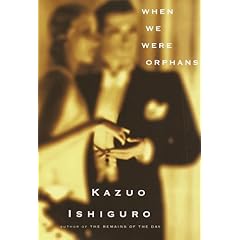 A quotation on the back of the book jacket from a reviewer refers to Mr. Ishiguro’s “inimitably out-of-kilter vision.” THose are just the words I was looking for as I read this book —out-of-kilter. I find that frequently as I read more recently published fiction, in the last fifty years say, I feel a sense of culture shock. These people in I’m reading about are off-kilter, not quite insane, but not thinking logically, not quite right. Eldest Daughter says it’s a feature of post modern fiction and post-modern culture. I guess I’m just a modernist, or maybe Victorian.
A quotation on the back of the book jacket from a reviewer refers to Mr. Ishiguro’s “inimitably out-of-kilter vision.” THose are just the words I was looking for as I read this book —out-of-kilter. I find that frequently as I read more recently published fiction, in the last fifty years say, I feel a sense of culture shock. These people in I’m reading about are off-kilter, not quite insane, but not thinking logically, not quite right. Eldest Daughter says it’s a feature of post modern fiction and post-modern culture. I guess I’m just a modernist, or maybe Victorian.
Anyway, I picked up When We Were Orphans at a used book sale because I enjoyed Ishiguro’s Never Let Me Go so much. I didn’t enjoy this book as much. The narrator was . . . odd. (It must be the week for odd. See this review of The Book Thief.) Christopher Banks, the aforementioned narrator, is such a distinctive personality that it is hard to decide, but I almost convinced myself that Ishiguro was trying to make Banks the embodiment of what was wrong with the British attitude toward the world, and particularly China, prior to World War II. Banks is blind, majoring on minor issues that don’t seem at all minor to him, while the world around him is a literal war zone. The British, too, were blindly crying out “Peace, Peace!” when there was no peace. Then again, Banks’ blindness has to do specifically with his parents and his orphaned state. The British government wasn’t searching for its lost parents. So the analogy only goes so far before it breaks down.
Mr. Ishiguro tells a good story and creates intriguing characters, even if his protagonist does have a bit of a bug in his brain. The other characters in the novel are believable, but negligible. Christopher Banks is the center of interest. The setting for the second half of the story is Shanghai, 1937. Wartime Shanghai is vivdly portrayed, even though the person doing the portraying is somewhat myopic. Somehow the author manages to enable us to see through his narrator. And that vision leads to an ambiguous ending in which Christopher Banks believes he has finally found out what happened to his parents, but I’m not so sure I’m buying the story. So we’re left with more post-modern ambiguity. It’s pretty good slightly off-kilter ambiguity, as evidenced by the fact that I’m still trying to figure it out two days later, if you like that sort of thing.
If you’ve never read anything by Ishiguro, I recommend Never Let Me Go. (Semicolon review here.) If you like that one, and if you like off-center, you’ll probably enjoy When We Were Orphans, too.
Today I blogged about used books. There’s a reason they are in the sale bin.
Norma’s comment cracks me up. I bought a First Novel for a $1 or something on a clearance rack. Yes, there was a reason it was a dollar. It’s one of the few times I didn’t finish a book (not because it was that awful, but I’ve just realized my time is too dear).
I might put Never Let me Go on my list. I find that more and more books and movies do strike me as depressing, even when they don’t intend to be, just because of their outlook towards life.
Pingback: Semicolon